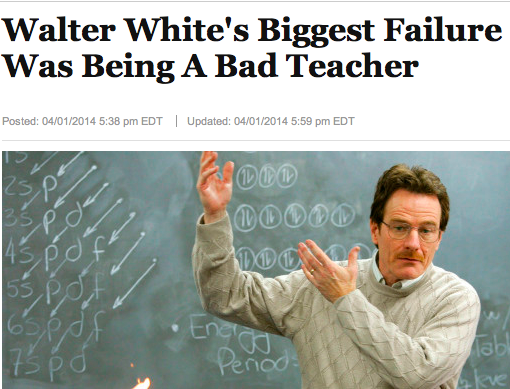I reluctantly watched with eyes sometimes covered Breaking Bad
…an Emmy-award winning series about Mr. White, a chemistry teacher with cancer, who loses his moral compass and uses his knowledge for evil.
Although I am a fan of crime dramas (I’ve posted about CSI here before), Breaking Bad went way beyond the usual formula. The disturbing and frightening criminal activities portrayed through the series were not for the faint of heart…and certainly tested my somewhat naïve Pollyanna tendencies.
AND the disrespectful (…to say the least…) ‘teaching style’ (?) the main character used when trying to ‘educate’ a former student made me cringe.
A professor at John Hopkin’s University even wrote an essay on this and claims that:
Thankfully, there have been no ‘Walter Whites’ in my life…
I loved science as an elementary student.
I can still remember when my dad made my helped me make my own solar system using the wire frame of an umbrella and several styrofoam balls [way back when Pluto was still a planet].
I enjoyed participating in science fairs in elementary school (and not just for the ribbons) and later enjoyed teaching science units to elementary students.
But sadly I don’t recall science fairs when I was in high school?
So imagine my delight when recently reading about a science fair project by a student
who used her cancer diagnosis for good (…and not for bad like Mr. White!)
I think I’ve always been fascinated by all-things-science yet I only recall high school chemistry as a textbook and a table of elements to memorize…I dragged my feet to that class…I just wasn’t very engaged.
Perhaps the ‘element’ of surprise was missing? haha 😉
As mentioned in previous posts (like “Favourites” and “Beautiful Brains”), I have been interested in the science of psychology since high school. I was fully engaged in my elective psychology class (some may say a “soft science”) but not in chemistry class (considered a “hard science”) – yet both had to do with chemicals?
If I could go back and study those two classrooms, what would I notice?
I find it interesting to see the gender imbalance discussion still alive when it comes to sciences. For example, see The Guardian (UK context) for a post entitled Teaching Psychology in schools would encourage more girls into science by Marc Smith (2013).
Following high school, I would happily run (no dragging feet this time) to undergraduate courses in biopsychology, neuropsychology, abnormal psychology…you name it, I was there – and I was in the front row. I continue to find neuroscience topics intriguing (I even bought a neurotransmitter necklace a couple of years ago at a psychology conference. Apparently this is how much of a geek I am what the norepinephrine looks like under the microscope):

Purchased from the Psych Store (http://www.thepsychstore.com) at a conference in 2012 🙂
So I guess it’s not surprising that one of my motivational research interests in educational psychology lies in the context of science education – as experienced by both students and teachers. The state of science education has been on my mind lately for several reasons:
- I have heard the word ‘cancer’ too many times lately…even hearing about it affecting one person is one too many times (see my latest Charity Spotlight page for ways to help)… but it was encouraging to read about an 18-year old cancer researcher’s science fair project! Do you recall any of your science fair projects?
- I am helping with a ground-breaking international project on teacher effectiveness and the psychological characteristics of potential teachers (applying for entry into a teacher education program) and teachers applying for teaching jobs. There are reports of a shortage of high school teachers for the maths and sciences yet there are more primary trained teachers than primary jobs in Australia. Recent graduates with primary training are apparently being encouraged to retrain as secondary teachers in the maths and sciences – which begs questions like, Can any teacher be “made” into a teacher of secondary sciences? What about those who feel they are “born to teach primary students?”
- Speaking of “made” vs “born,” I also find the work of Carol Dweck very relevant in discussions of maths and sciences. Dweck’s research looks at mindsets of intelligence as either fixed (“I’m just not good at maths and sciences”) or incremental growth-oriented where, given your basic abilities, effort can make a difference in what you learn. Have you ever caught yourself expressing a ‘fixed-mindset?’
- There is not only a reported shortage of science teachers, but apparently a worker shortage in other STEM-related fields (*STEM = Science, Technology, Engineering, and Mathematics). I am part of a team of educational psychologists and medical science educators currently working on an exciting science education research project – one that has the potential to inform ways of engaging students and encouraging future study or career paths in science. I also hope this project will feed into my research on teachers’ professional learning and development – particularly with respect to the sciences. If you could choose any “scientific” profession and be guaranteed to succeed, what would you choose?
With a research focus on high quality teaching and student engagement, maybe we can promote the learning climates needed for more life-changing* science fair projects and more STEM students opting to train for STEM careers!
*life-changing in a POSITIVE way – and not the kind of life-changing science showcased in Breaking Bad 😦
If you’re curious about the ‘real science’ behind Breaking Bad, the Royal Society of Chemistry took advantage of the show’s popularity and posted a few articles
(…warning, not for the faint of heart): Breaking Bad Chemistry



